Quantic Dream’s upcoming PS4 exclusive, Detroit: Become Human, has caused quite a stir since it was announced back in 2015. It’s understandable too, given that the game deals with some rather heavy themes — ranging from domestic abuse to grotesque homicide — and there’s clearly a fine line that the developers have needed to tread. That said, following some hands-on time with the game’s opening hours, I came away fairly impressed with what I played. It seems like the French studio have learned a lot from their previous efforts, refining and crafting an interactive narrative experience that feels much closer to Heavy Rain than it does Beyond: Two Souls.
Detroit focuses around three main characters: Kara, Connor, and Markus. It’s evident from the protagonists’ opening ‘scenes’ that Quantic Dream have strived to make each feel noticeably different from one another; not just in terms of character traits, but also through the way the story develops around them. Kara’s narrative revolves around an abusive father and his daughter, whereas Markus takes care of an old wealthy painter who has a love for the fine arts, while Connor’s involved in the policing of the city. All three main protagonists are androids (though their android classes and versions differ), with the game taking place in Detroit, 2038. So we’re a bit ahead in the future, but not that far.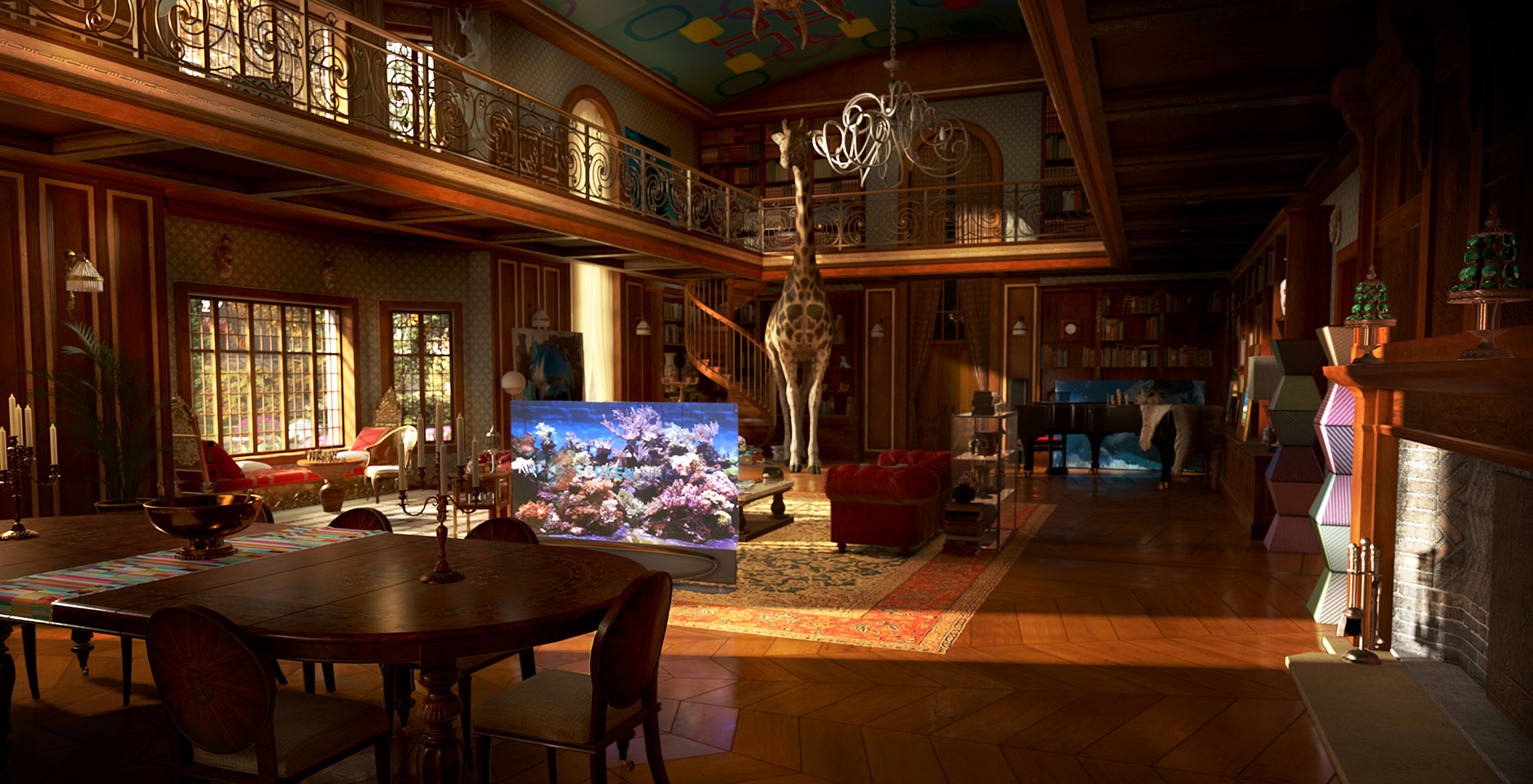 The world that Quantic Dream have crafted feels as close to what you’d imagine if you were to logically look forward in time, where androids have taken over most of the laborious and time-intensive tasks, while also acting as assistants for humans. Understandably this has been the catalyst to the rise of civil unrest, as androids have pushed a lot of humans out of work.
The world that Quantic Dream have crafted feels as close to what you’d imagine if you were to logically look forward in time, where androids have taken over most of the laborious and time-intensive tasks, while also acting as assistants for humans. Understandably this has been the catalyst to the rise of civil unrest, as androids have pushed a lot of humans out of work.
This is where the game’s central plot, I assume, will look to unfold. The growing tension between androids and humans can only rise so high before all hell breaks loose, and I’m looking forward to seeing how the developers explore this issue. Further, all three characters started to feel human-like emotion and distress with the problems and challenges they were faced with as I played through, and I’d say this’ll also become a central element to the plot as well. There’s a lot of potential here, and I hope Quantic Dream can handle it.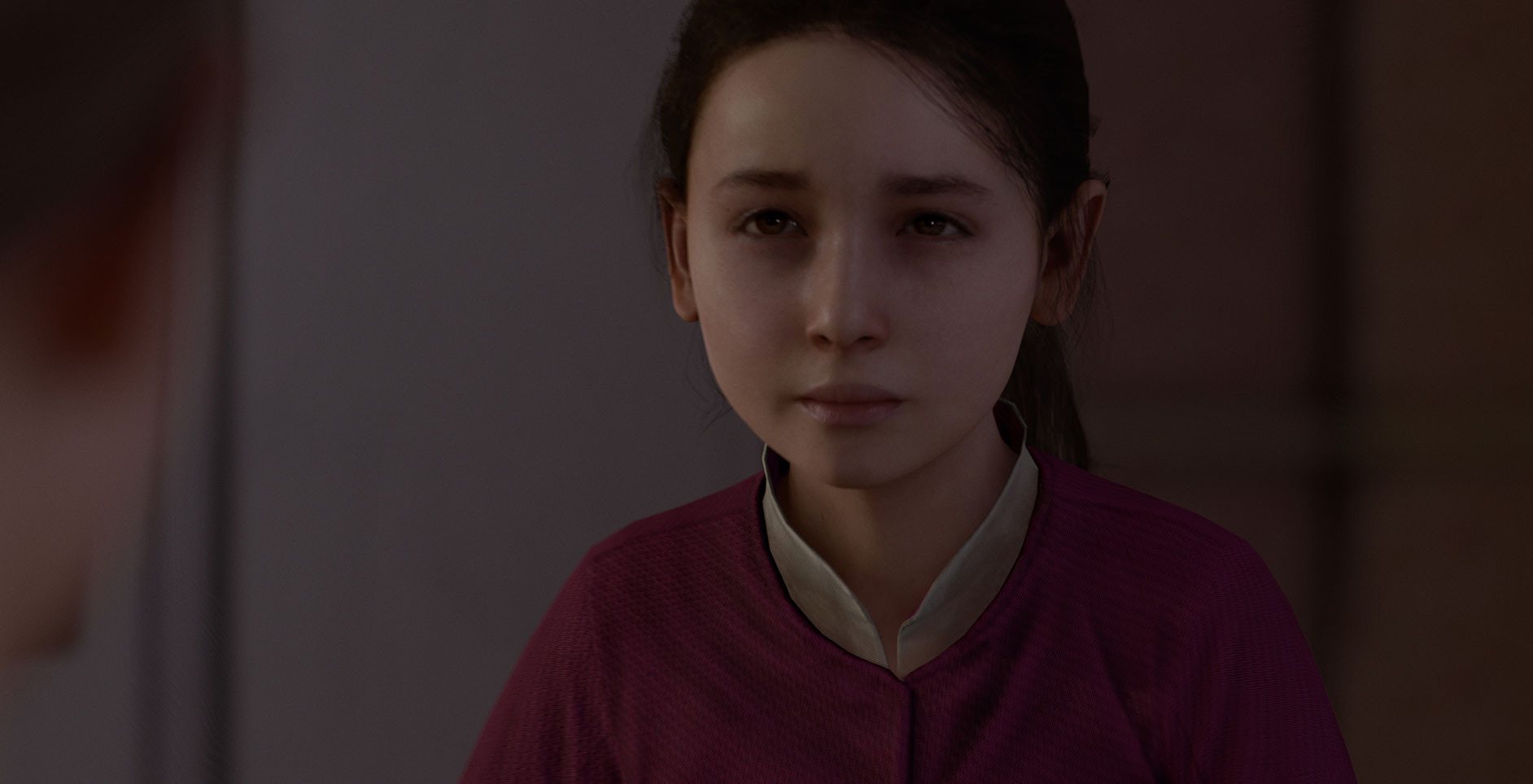 Of course, one of the defining gameplay characteristics behind Quantic Dream’s games is the idea of choice and consequence. It’s a more refined formula than Telltale’s titles, where you dabble around decisions and ultimately finish in a similar area no matter what you choose, and Detroit looks to push those boundaries further.
Of course, one of the defining gameplay characteristics behind Quantic Dream’s games is the idea of choice and consequence. It’s a more refined formula than Telltale’s titles, where you dabble around decisions and ultimately finish in a similar area no matter what you choose, and Detroit looks to push those boundaries further.
At the end of each of the game’s scenes, you’ll be presented with a flowchart and will be awarded a score depending on how you did (and how much you explored). Exploring scenes gives you more possibilities in combat scenarios, quicktime events, and dialogue options, so it’s always worth going through each with a keen eye. The more things you find, the more you’ll tick off on the flowchart, which can be revisited after you’ve completed that part of the game. If you don’t like what unfolded (which happened more than a few times in my preview session), you can always go back and overwrite your save which will change your choices and consequences later on down the track. You can also choose to re-do the sequence without having the data overwritten as well, which is a nice little feature.
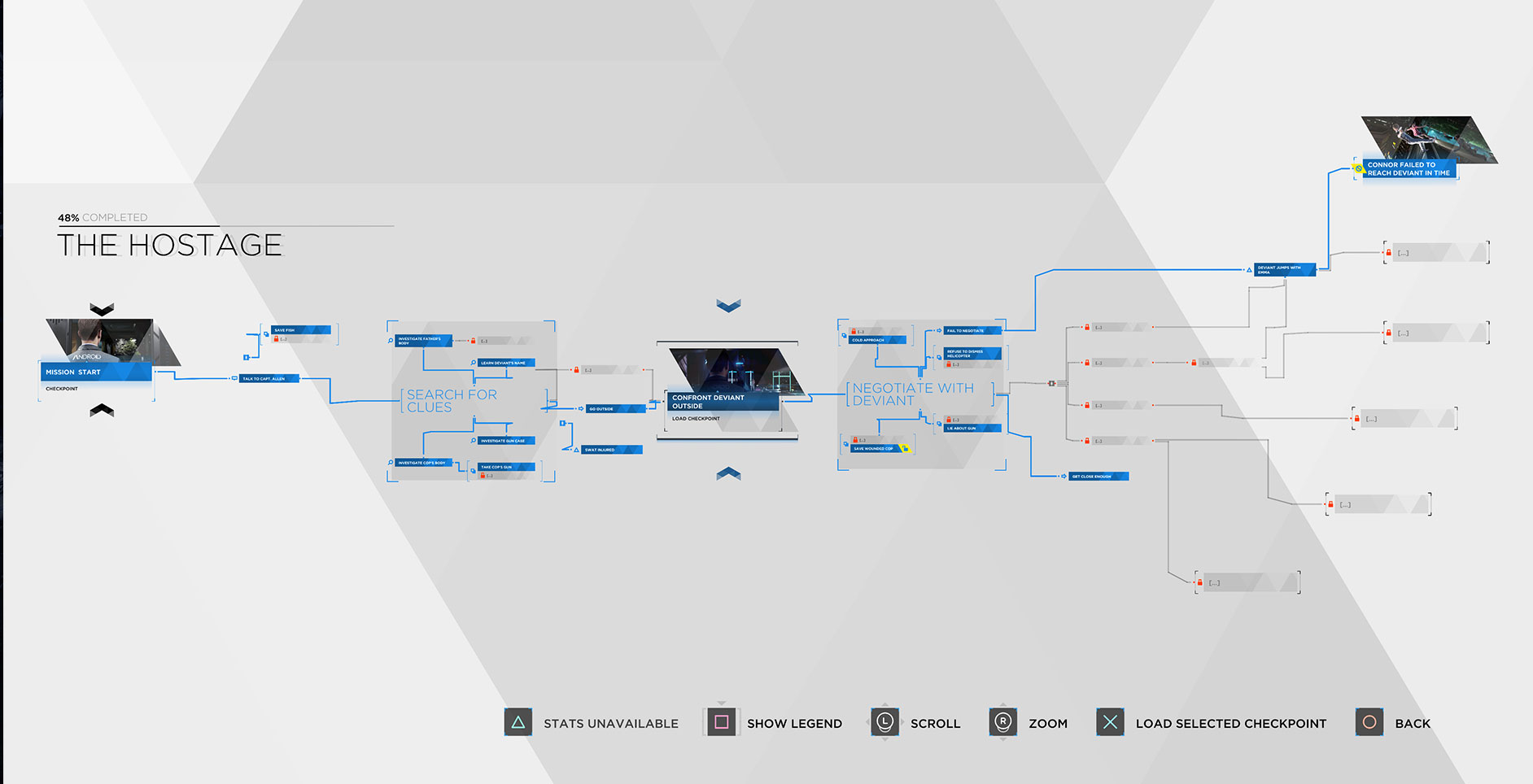
Something I noticed with the flowchart was that a fair amount of the game’s scenes end in more than two scenarios, which should prove to be a sound reason to give the game (and/or scene) a replay. It looks like the developers have made this a central part of the game — encouraging you to give scenes another crack after all is said and done — which is neat. There were more than a few sequences that I jumped back into after I’d reached the end of my session, in turn allowing me to explore further and see what else I could uncover in order to change the events I’d played through previously.
Each of the characters’ stories resonated with me in some way or another as well, which was something that didn’t happen at all in Quantic Dream’s last game, Beyond: Two Souls. The jump to a futuristic setting, while attempting to remain grounded, has done the team a world of good in terms of creating a world that feels interesting to explore and involve yourself in. Of course, each of the characters’ narratives might derail down the line, but from what I played I liked the way Kara, Connor, and Markus’ narratives developed and where they were headed. It’s not often that I feel so invested in each of the main narrative arcs, but Detroit definitely sunk its hooks in, and that, more than anything, surprised me quite a lot.
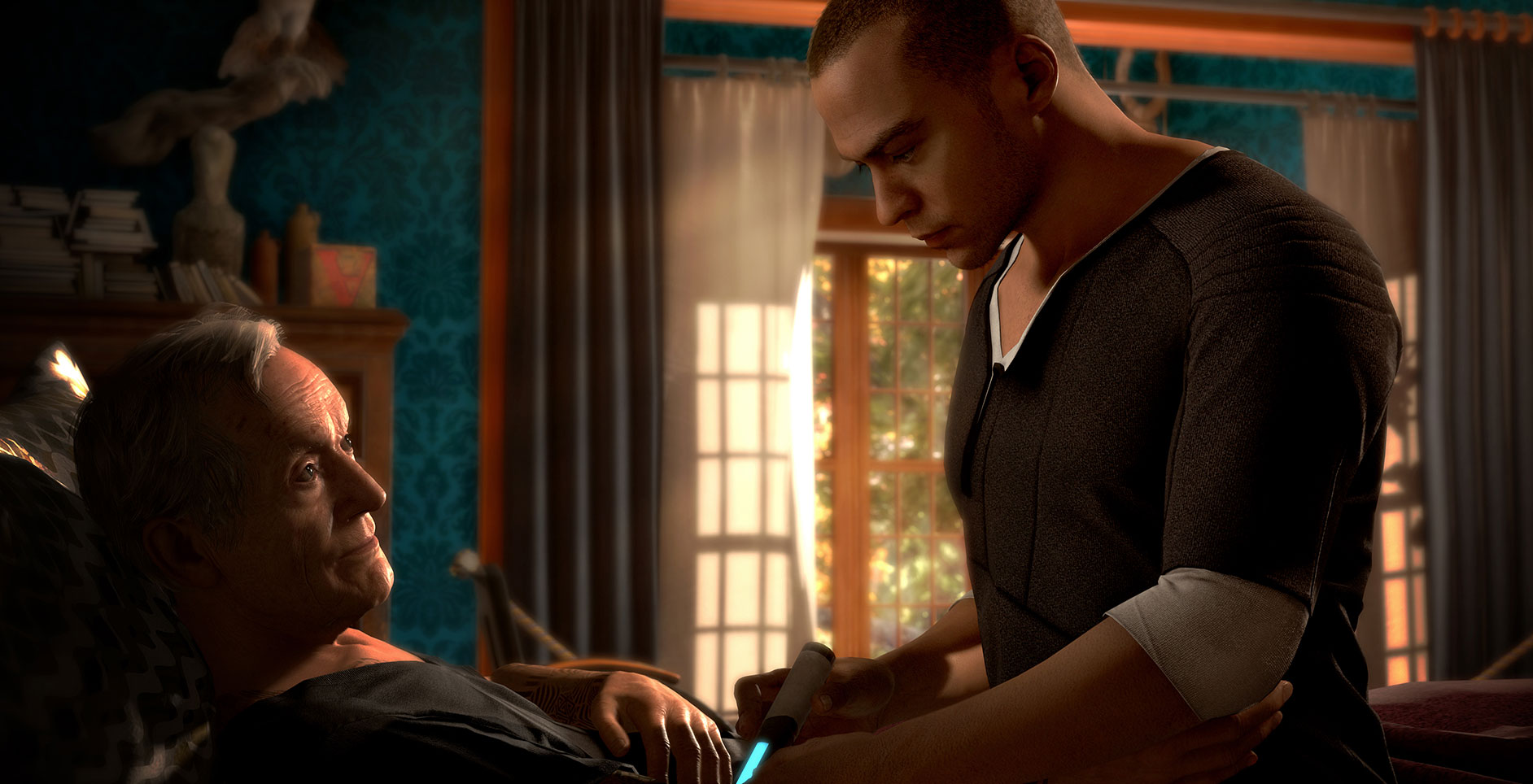
That said, I’m really curious as to how the narrative develops over the game’s duration. Given the fact all three characters went through a life-changing moment throughout those opening hours of gameplay, I’m intrigued to see how Quantic Dream continue to develop them as time passes. So much was at stake during these moments (which I’ll avoid spoiling), that I’m worried the defining experiences of these characters and the stories that are intertwined within have already played their best cards.
Game mechanics have been slightly refined in Detroit too, and are a marked improvement from Beyond: Two Souls. Those that have played previous Quantic Dream games will quickly fall back into the saddle as the game does play very similarly, though more investigative options and the futuristic setting gives you more to do in terms of interaction, which I appreciated.
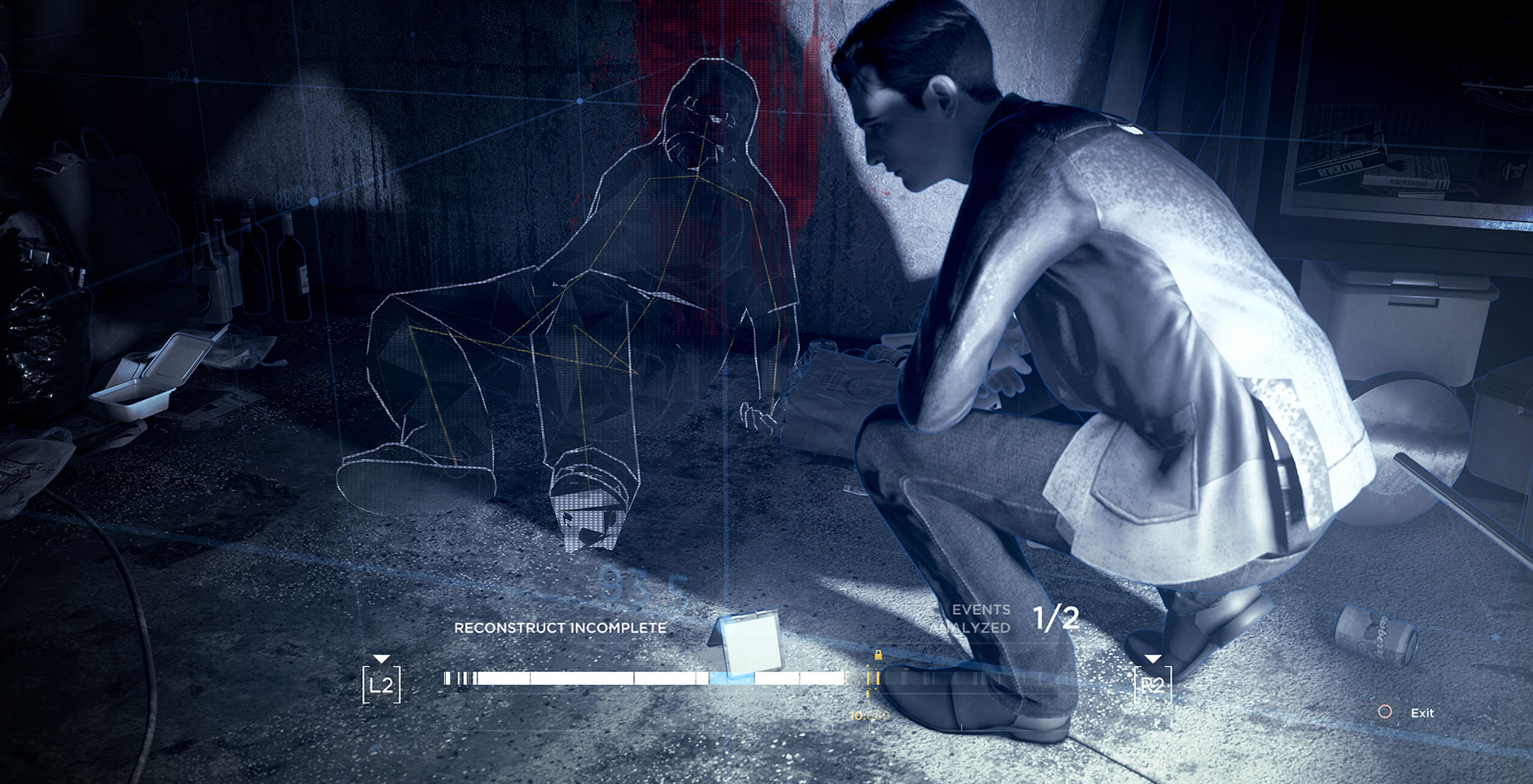
The game did throw up some fairly mundane things to do in the opening hour in particular, though — from cleaning a kitchen to tidying up a painting studio — which is something Quantic Dream have been known for. This is where my immersion was at its lowest, though these moments were often surrounded by more interesting sequences. Hopefully as the game goes on these moments become less of a thing, as they did feel like a drag.
Something that didn’t surprise me in the slightest was the game’s compositional work. It sounds phenomenal, and I was thoroughly impressed with what I heard throughout those two hours of gameplay. Similarly, the game looks excellent — environments pop, as do characters and the way they interact with objects. It’s not quite as beautiful and detailed as God of War, but the game’s certainly up there with some of the best looking titles on the PlayStation 4.
I went into my preview session not expecting much from Detroit, but I came out impressed. After what was a hugely disappointing experience in Beyond: Two Souls, I was fearful for the team and their ambitiousness in taking on something like Detroit: Become Human. However, the game’s opening two hours were enthralling, and I’m really looking forward to seeing where the story goes when it launches next month. It’s unusual for me to feel so intrigued following a preview session, but Quantic Dream’s latest hit the right note — at least for now. We’ll have to see how the full game pans out as the story can go in a multitude of different directions, but I’m surprised with what’s on offer here. It’s definitely more Heavy Rain than Beyond, and that can only be a good thing.



